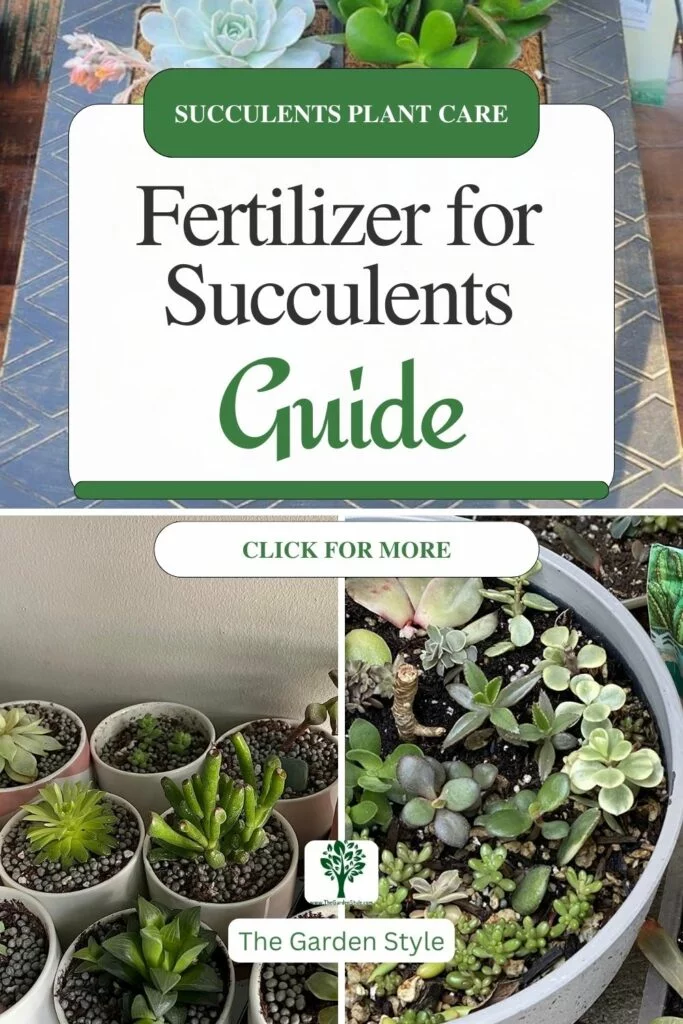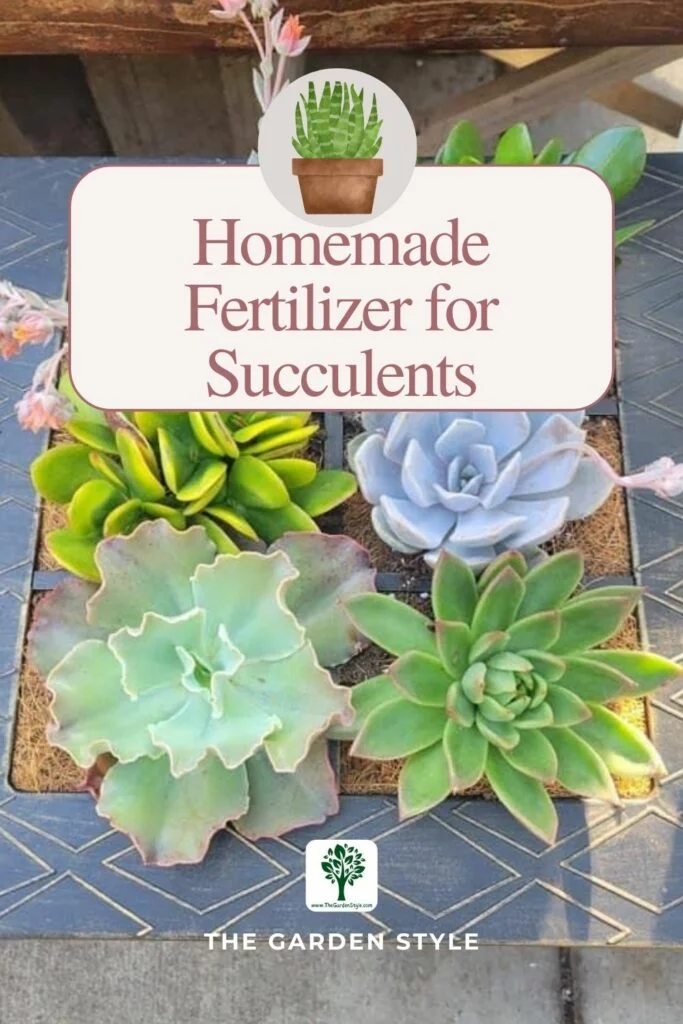Succulents, renowned for their adeptness at storing both moisture and nutrients, usually require less watering and fertilizer than other varieties of houseplants. In this article, we will delve into the world of the best fertilizers for succulents. First and foremost, let’s explore homemade fertilizers for succulents – those DIY solutions we can create right at home to provide the essential fertilizer for succulents. Then, for those who may not be inclined to whip up their own concoctions, we’ll discuss commercial succulent fertilizers as a convenient alternative.
Table of Contents
Do Succulents Need Fertilizer?
Succulents do benefit from fertilizer, but the key is moderation. Unlike many common houseplants, they don’t demand hefty amounts. However, it’s essential to recognize that potted succulents, especially in containers, can exhaust their nutrients over time. So, while they don’t need as much as some other plants, a boost is beneficial.
It’s also worth noting that indoor succulents have their own preferences when it comes to nutrients. They aren’t big fans of excessive fertilizing – a half-strength dose at intervals suits them better.
Dispelling the myth that succulents thrive solely on sunlight and neglecting their nutrient needs is crucial. While they don’t require as much as some other green companions, a touch of well-balanced fertilizer can go a long way in maintaining their health and vibrancy.
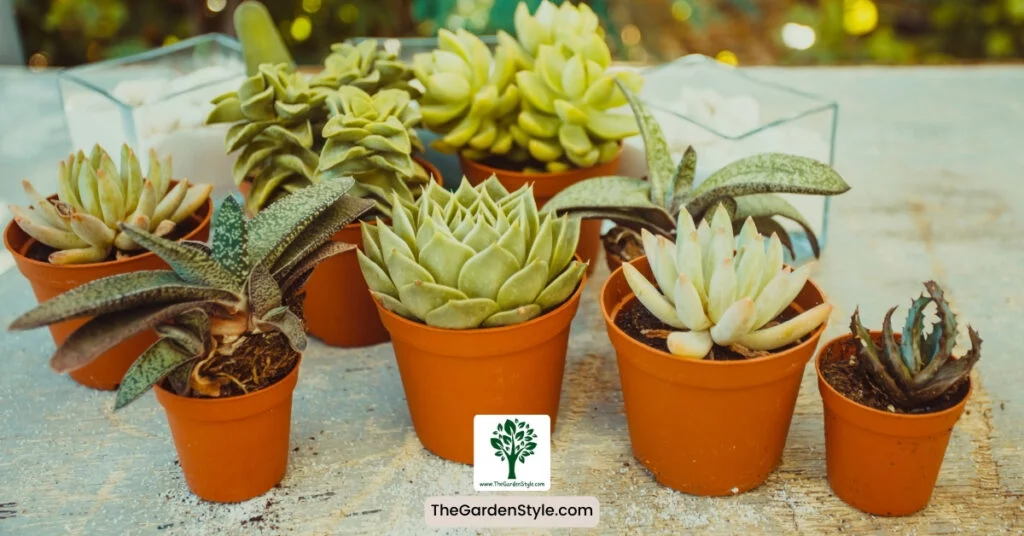
Fertilizing Succulents Indoors Vs Outdoors
When located outdoors, succulents have a knack for thriving without much fuss, especially if the soil quality is top-notch. In a well-balanced outdoor environment with nutrient-rich soil, succulents can often get by without the need for additional fertilization.
Now, when we shift our attention indoors, the dynamic changes. Succulents in pots, confined to the limited space of a container, encounter a different scenario. The soil in pots gradually loses its nutrients over time, and unlike their outdoor counterparts with the luxury of nutrient-rich surroundings, indoor succulents can’t naturally replenish those lost nutrients.
Indoor succulents, therefore, benefit from a helping hand in the form of regular, yet conservative, fertilization. The controlled environment of indoor plant care necessitates a more proactive approach in ensuring these fascinating plants receive the essential nutrients they might miss out on due to the limitations of potted soil.
In essence, while outdoor succulents can often fend for themselves thanks to favorable soil conditions, their indoor counterparts appreciate a bit of nutritional support to keep them thriving in the confined ecosystem of a pot.
When to Fertilize Succulents?
According to Cindy Schnabel, South Dakota State University (SDSU) Extension Horticulture Assistant and Master Gardener, succulents require minimal fertilization. We should only nourish them during the spring and summer months when the plant is actively growing. This timing helps protect vulnerable new growth from potential cold damage during fall and winter. If considering an additional dose, wait about two to three months after the first application, around mid-summer. Avoid fertilizing close to anticipated temperature drops, especially if your succulents are outdoors and exposed to the cold.
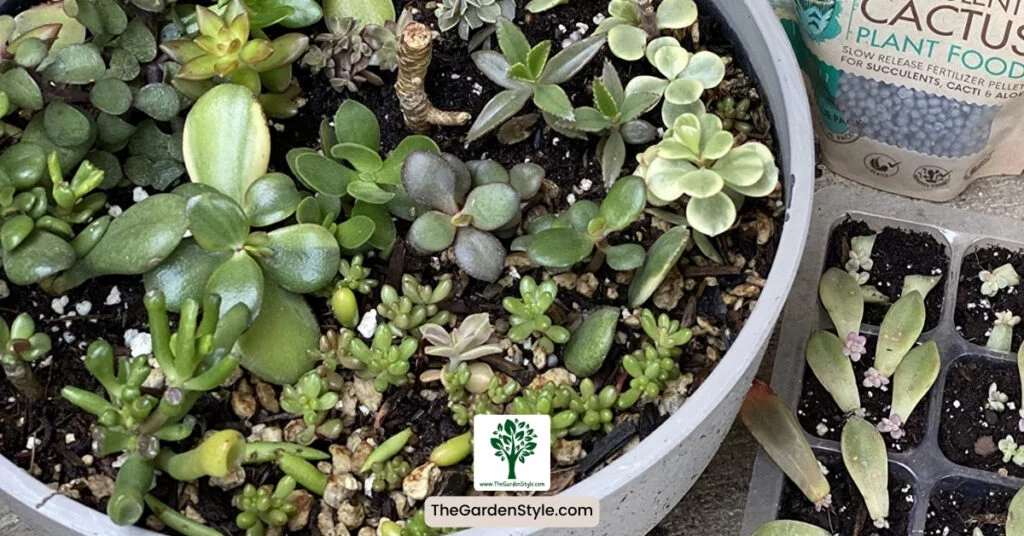
What Fertilizer for Succulents?
When choosing the right fertilizer for succulents, you can opt for:
- Buy a specific fertilizer for succulents.
- Use a universal fertilizer for indoor plants.
- Make our homemade fertilizer for succulents, as we will explain later.
The truth is that there are not many succulent-specific fertilizers on the market, and partly, that is because there is such a diversity of succulents with such different needs that it is challenging to produce a fertilizer that fits them all.
Towards the conclusion of this article, we’ll provide links to succulent fertilizers that we’ve personally tested and found successful on our own plants at The Garden Style.
What Fertilizer NOT to Use for Succulent Plants
Do not use fertilizers with high nitrogen content. Excessive amounts of nitrogen will make the plant grow fast, but it will be too weak to defend itself against common pests. Don’t use fertilizers if the amount of nitrogen is higher than 15.
How Often to Fertilize Succulents?
Throughout the growing season (spring and summer), succulents can thrive with more regular fertilization, typically every 2-4 weeks. The frequency varies based on plant types and container sizes, ensuring a balanced nourishment without overwhelming them.
Post-repotting, I refrain from feeding as the fresh soil usually holds sufficient nutrients, preventing any potential stress on the roots. Fertilizing too soon after a soil change may disrupt the delicate balance.
For those using a diluted solution, more frequent applications are an option, but vigilance is vital to avoid signs of overfertilizing. For those opting for NPK fertilizers, I recommend reading the manufacturer’s instructions. Each product comes with specific guidelines, and adhering to them ensures optimal use and benefits for your succulents.
Recommended reading: Amazing Succulents with Yellow Flowers
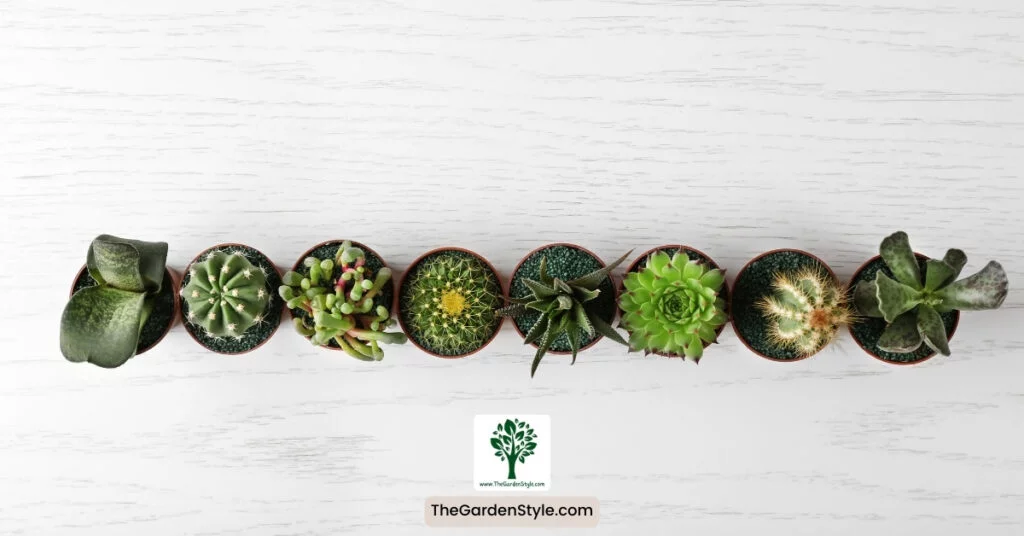
Homemade Fertilizer for Succulents
For those eager to whip up their own homemade succulent fertilizer, I’ve got three fantastic and easy-to-make recipes for you. Banana peels, eggshells, and rice water stand out as excellent ingredients to craft your personalized succulent nourishment. Let’s explore the ease of making homemade fertilizer for your cherished succulents!
Recommended reading: How to Take Care of Succulents
Homemade Fertilizer for Succulents with Banana Peels
Creating this homemade fertilizer for succulents is a breeze; all you need are the following:
- The peels of 5 bananas.
- 32 oz of water (1 liter).
Here’s how you make it:
- Bring the water to a boil, and once boiling, add the banana peels. Reduce the heat and let it simmer for about 10 to 15 minutes.
- After the allotted time, allow it to cool. Remove the peels, and the liquid left behind becomes your succulent fertilizer.
I recommend using this organic fertilizer on blooming succulents and cacti. Adding it once every two weeks provides them with an extra dose of potassium, benefiting their flowering.
If you prefer, you can directly place the peel in the substrate. For this method, ensure the peels are thoroughly dried and cut into small pieces before placing them in the pot.
Keep in mind this organic fertilizer decomposes quickly. To maximize its effectiveness, prepare it a day before use and use it all at once.
Homemade Fertilizer for Succulents with Eggshells
Eggshells serve as fantastic calcium boosters for our succulents. To prepare your very own DIY succulent fertilizer, simply give the eggshells a thorough wash, ensuring all traces of white and yolk are entirely removed. After cleaning, let them air-dry thoroughly, preferably under sunlight. Once dry, grind them using a blender— the finer the powder, the better.
Seamlessly mix this DIY succulent fertilizer made from pulverized eggshells into the substrate of your succulent plants and cacti. The quantity used depends on the size of the pot. A typical recommendation is to incorporate approximately one teaspoon of powdered eggshell per 4-inch pot. Learn more about eggshells for plants in the garden.
Homemade Fertilizer for Succulents with Rice Water
If you’re used to cooking rice, you know the practice of washing it to eliminate the remaining starch. Well, here’s a little tip: don’t discard that water anymore; it’s a valuable resource for your succulents.
After washing rice, save the water you used for rinsing. This water, rich in nutrients, serves as an excellent base for your succulent fertilizer. Take a portion of rice water and dilute it with three parts room-temperature water. Stir the mixture thoroughly to ensure an even distribution of nutrients.
Similar to the banana peel fertilizer, it’s advisable to use it promptly upon preparation, as storing it for later won’t yield the same effectiveness. Learn more about rice water for plants.
Best Fertilizers for Succulents
If crafting your homemade succulent fertilizer isn’t your preference, you can opt for specific, high-quality commercial fertilizers that we’ve successfully tested. Succulents prefer a steady, slow-release supply of nutrients. Choosing a slow-release fertilizer ensures a gradual and consistent nourishment, preventing the risk of over-fertilization.
Avoid fertilizing during dormant periods, such as winter, to prevent unnecessary stress on the plants. We recommend the following, and you can conveniently purchase them directly through the provided links at no additional cost.
- [Long Lasting, Less Work] – An easy one time granular application can feed your potted indoor or outdoor houseplant for several months, with all of the Nutrient release happening only when you water.
- LIGHT APPLICATIONS – A balanced mix of essential nutrients with low NPK rates to gently feed your live cacti and succulents. It help enhance root development, color vibrancy, beautiful bloom, and stem growth in both plant types.
- NEW innovation from Jobe’s Organics – easytoinsert spikes specially formulated for succulents and cacti
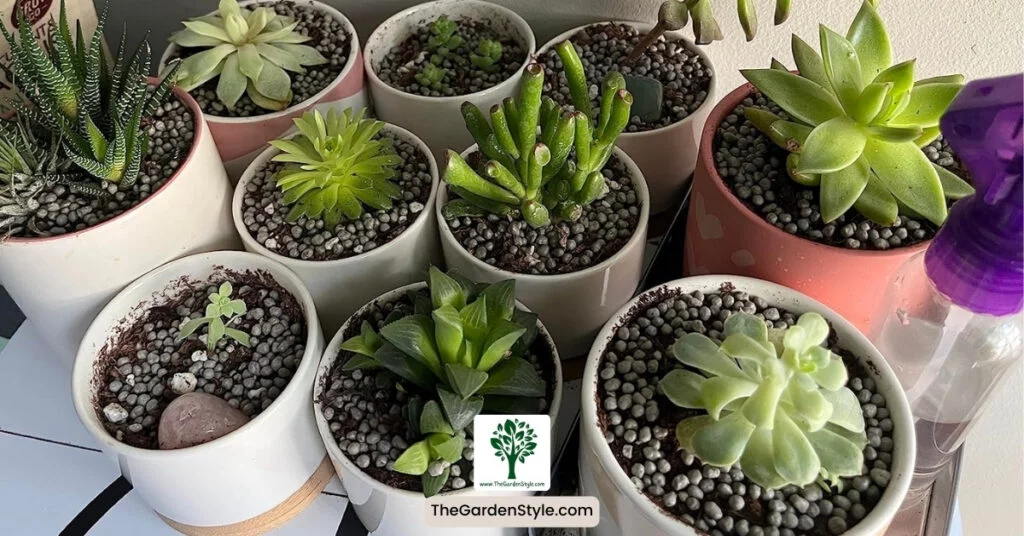
If this post about fertilizer for succulents was helpful, please share it:
